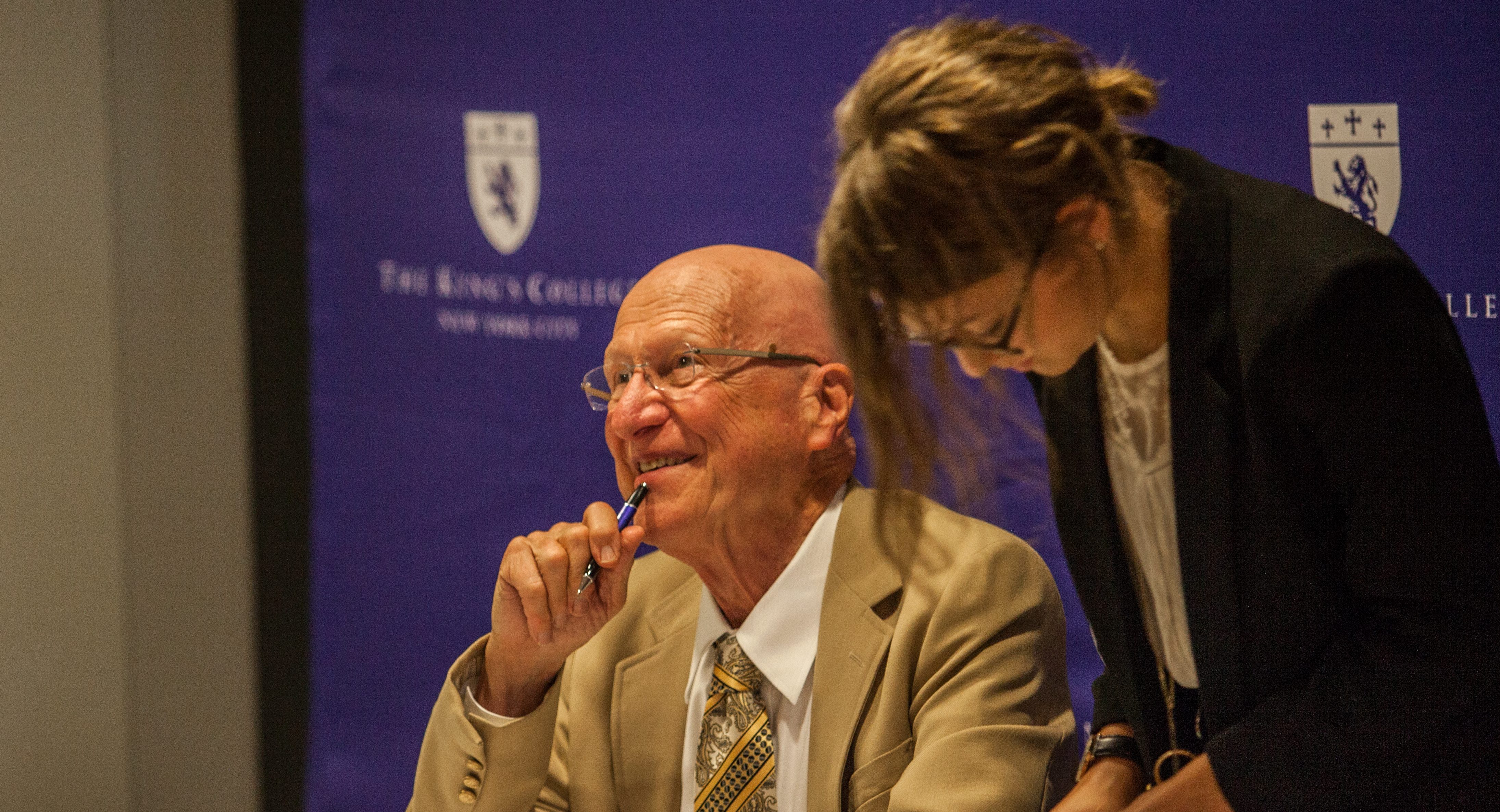Dr. Peter Kreeft Launches ‘Between One Faith and Another’ at King’s
On September 13, The King’s College hosted Dr. Peter Kreeft for a lecture and book signing to launch Between One Faith and Another: Engaging Conversations on the World’s Great Religions.

On September 13, The King’s College hosted Dr. Peter Kreeft for a lecture and book signing to launch Between One Faith and Another: Engaging Conversations on the World’s Great Religions (InterVarsity Press, 2017). The lecture was well-attended by alumni, students, faculty, and staff, and many stayed afterward to speak with Kreeft and to purchase signed copies of the book. Kreeft is a tenured professor at Boston College and a distinguished visiting professor of philosophy at The King’s College.
In the lecture, Kreeft explained the animating question behind Between One Faith and Another: How do the religions of the world relate to one another? For Kreeft, this question emerges from the even more primary issue of one’s relationship with God. For most of human history, people of all cultures saw religion as the most important thing in all of human life. If atheism is true, this religious majority is subject to a mass delusion, as Freud argued in Civilization and Its Discontents. But “If religion is true, atheists are nuts,” Kreeft said. “Either 5 percent or 95 percent of humans are insane.”
After the vertical relationship to God, the next important matter is how the religions of the world relate to one another. Kreeft posed three possible approaches. The inclusivist claims all religions of the world are essentially the same, or at least compatible. The exclusivist argues that the truth claims of different religions contradict each other. Finally, the pluralist believes that it is impossible to say.
These three stances form the basis of the three characters in Between One Faith and Another. Kreeft structures the book as a trialogue between Thomas Keptic, Bea Leaver, and Professor Fessor. Along the way, he provides a summary of the fundamental teachings of eight world religions.
It might be tempting for a Christian writing a book on comparative religion to conclude with what Kreeft called “the knock-em-down, sock-em-dead, final answer.” After all, Kreeft admitted, a claim like “God had a son who became incarnate” logically excludes the claims of other religions. However, the approach Kreeft described taking in the book is more layered: “Every religion has three levels: intellectual, moral, and liturgical. Intellectually, exclusivism seems to be true. But morally, every one of them says to the ego, ‘Get off the throne.’ If you look at the moral dimension of religion as the essential one, you tend towards inclusivism.”
In the question and answer period that followed, students probed into the basis of Kreeft’s perspectives on world religions. One student asked if there might be those outside the Christian tradition, like Plato, who received divine revelation. Kreeft cited the view held by almost all of the church fathers that Greek philosophy, including the concepts of logos (the Word) and dunamus (power), was part of the preparation for Christ’s coming. Kreeft also suggested that the god Socrates worshipped was the same one revered at the altar “to the unknown god” the Apostle Paul saw at the Acropolis.[1] Responding to a question on his understanding of inclusivism, Kreeft described conversations he had with Buddhists and zen masters who believe in the unity of religions not because they have seen the vision of unity themselves, but because they have faith in the mystical experience of a few.
Both in his lecture and in answering questions, Kreeft took care to assert only what he knew: “I don’t claim to have solved the problem. I just claim to have cast a little bit of light on it. I have to conclude where Socrates concludes: I really don’t know all the answers.”
Upon the launch of Kreeft’s book, President Gregory Alan Thornbury said, “We at The King’s College owe a great debt of gratitude to Dr. Peter Kreeft. The late William Lee Hanley, Jr., who was Chairman of the Board and a fierce champion of all King’s holds dear, marks reading Kreeft’s Three Philosophies of Life as a turning point in his relationship with Jesus Christ. Like Lee Hanley, so many of us have been challenged, both intellectually and personally, by Peter Kreeft’s scholarship. Every week, Dr. Kreeft graces us by making the three-hour trip from Boston to New York to teach here at King’s. I could not be more proud to have a part in ushering in the newest addition to the great library of Kreeft’s work.”
A free, self-paced micro-course by Dr. Kreeft titled “A Sample of Key Concepts from Thomas Aquinas,” featuring video lectures, readings, questions for reflection, and a discussion board is now available online. Click here to sign up.
[1] Acts 17:23: “For as I passed along and observed the objects of your worship, I found also an altar with this inscription: ‘To the unknown god.’ What therefore you worship as unknown, this I proclaim to you.”




